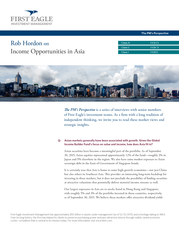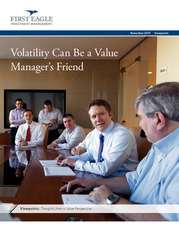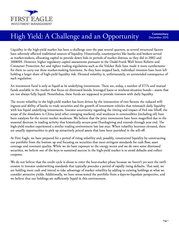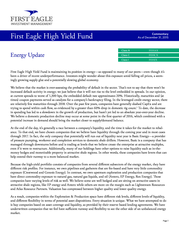Description
First Eagle High Yield Fund
Commentary
As of December 31, 2015
Funds that invest in bonds are subject to interest-rate risk and can lose principal value when interest rates rise. Bonds are also subject to credit risk, in which the bond issuer may
fail to pay interest and principal in a timely manner, or that negative perception of the issuer’s ability to make such payments may cause the price of that bond to decline.
The Fund invests in high yield securities (commonly known as “junk bonds”) which are generally considered speculative because they may be subject to greater levels of interest
rate, credit (including issuer default) and liquidity risk than investment grade securities and may be subject to greater volatility. The Fund invests in high yield securities that are
non-investment grade. High yield, lower rated securities involve greater price volatility and present greater risks than high rated fixed income securities.
High yield securities are rated lower than investment-grade securities because there is a greater possibility that the issuer may be unable to make interest and principal payments on those securities. All investments involve the risk of loss. Bank loans are often less liquid than other types of debt instruments. There is no assurance that the liquidation of any collateral from a secured bank loan would satisfy the borrower’s obligation, or that such collateral could be liquidated. There are risks associated with investing in funds that invest in securities of foreign countries, such as erratic market conditions, economic and political instability and fluctuations in currency exchange rates.
Funds whose investments are concentrated in a specific industry or sector may be subject to a higher degree of risk than funds whose investments are diversified and may not be suitable for all investors. The securities mentioned herein represent the following percentage of the total net assets of the First Eagle High Yield Fund as of December 31, 2015: Basic Energy Services, Inc. 7.75% 02/15/2019 0.16%, Basic Energy Services, Inc. 7.75% 10/15/2022 0.17%, Crestwood Midstream Finance Corp.
6.0% 12/15/2020 0.07%, Crestwood Midstream Partners LP 6.125% 03/01/2022 0.76%, Genesis Energy LP 6.0% 05/15/2023 0.41%, Antero Resources Corp. 5.625% 06/01/2023 1.07%, Antero Resources Finance Corp. 5.375% 11/01/2021 0.48%, EP Energy Corp.
9.375% 05/01/2022 0.76%, Rex Energy Corporation 6.25% 08/01/2022 0.13%, Rex Energy Corporation 8.875% 12/01/2020 0.16%, Lighstream Resources Ltd. 8.625% 02/01/2020 0.34%, Atlas Energy Holdings 7.75% 01/15/2021 0.25%, Atlas Energy Holdings 9.25% 10/15/2022 0.21%. The portfolio is actively managed and holdings can change at any time.
Current and future portfolio holdings are subject to risk. The commentary represents the opinion of the High Yield Team Portfolio Managers as of December 31, 2015 and is subject to change based on market and other conditions. The opinions expressed are not necessarily those of the firm. These materials are provided for informational purpose only.
These opinions are not intended to be a forecast of future events, a guarantee of future results, or investment advice. Any statistics contained herein have been obtained from sources believed to be reliable, but the accuracy of this information cannot be guaranteed. The views expressed herein may change at any time subsequent to the date of issue hereof.
The information provided is not to be construed as a recommendation or an offer to buy or sell or the solicitation of an offer to buy or sell any fund or security. Investors should consider investment objectives, risks, charges and expenses carefully before investing. The prospectus and summary prospectus contain this and other information about the Funds and may be obtained by asking your financial adviser, visiting our website at www.feim.com or calling us at 800.334.2143. Please read our prospectus carefully before investing.
Investments are not FDIC insured or bank guaranteed, and may lose value. First Eagle Funds are offered by FEF Distributors, LLC. www.feim.com First Eagle Investment Management, LLC 1345 Avenue of the Americas, New York, NY 10105-0048 .
High yield securities are rated lower than investment-grade securities because there is a greater possibility that the issuer may be unable to make interest and principal payments on those securities. All investments involve the risk of loss. Bank loans are often less liquid than other types of debt instruments. There is no assurance that the liquidation of any collateral from a secured bank loan would satisfy the borrower’s obligation, or that such collateral could be liquidated. There are risks associated with investing in funds that invest in securities of foreign countries, such as erratic market conditions, economic and political instability and fluctuations in currency exchange rates.
Funds whose investments are concentrated in a specific industry or sector may be subject to a higher degree of risk than funds whose investments are diversified and may not be suitable for all investors. The securities mentioned herein represent the following percentage of the total net assets of the First Eagle High Yield Fund as of December 31, 2015: Basic Energy Services, Inc. 7.75% 02/15/2019 0.16%, Basic Energy Services, Inc. 7.75% 10/15/2022 0.17%, Crestwood Midstream Finance Corp.
6.0% 12/15/2020 0.07%, Crestwood Midstream Partners LP 6.125% 03/01/2022 0.76%, Genesis Energy LP 6.0% 05/15/2023 0.41%, Antero Resources Corp. 5.625% 06/01/2023 1.07%, Antero Resources Finance Corp. 5.375% 11/01/2021 0.48%, EP Energy Corp.
9.375% 05/01/2022 0.76%, Rex Energy Corporation 6.25% 08/01/2022 0.13%, Rex Energy Corporation 8.875% 12/01/2020 0.16%, Lighstream Resources Ltd. 8.625% 02/01/2020 0.34%, Atlas Energy Holdings 7.75% 01/15/2021 0.25%, Atlas Energy Holdings 9.25% 10/15/2022 0.21%. The portfolio is actively managed and holdings can change at any time.
Current and future portfolio holdings are subject to risk. The commentary represents the opinion of the High Yield Team Portfolio Managers as of December 31, 2015 and is subject to change based on market and other conditions. The opinions expressed are not necessarily those of the firm. These materials are provided for informational purpose only.
These opinions are not intended to be a forecast of future events, a guarantee of future results, or investment advice. Any statistics contained herein have been obtained from sources believed to be reliable, but the accuracy of this information cannot be guaranteed. The views expressed herein may change at any time subsequent to the date of issue hereof.
The information provided is not to be construed as a recommendation or an offer to buy or sell or the solicitation of an offer to buy or sell any fund or security. Investors should consider investment objectives, risks, charges and expenses carefully before investing. The prospectus and summary prospectus contain this and other information about the Funds and may be obtained by asking your financial adviser, visiting our website at www.feim.com or calling us at 800.334.2143. Please read our prospectus carefully before investing.
Investments are not FDIC insured or bank guaranteed, and may lose value. First Eagle Funds are offered by FEF Distributors, LLC. www.feim.com First Eagle Investment Management, LLC 1345 Avenue of the Americas, New York, NY 10105-0048 .









